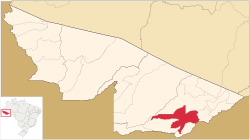Xapuri
| Xapuri | |||
|---|---|---|---|

Church of Saint Sebastian.
|
|||
|
|||
 Location of municipality in Acre State |
|||
| Coordinates: 10°39′07″S 68°30′14″W / 10.65194°S 68.50389°WCoordinates: 10°39′07″S 68°30′14″W / 10.65194°S 68.50389°W | |||
| Country |
|
||
| State | Acre | ||
| Area | |||
| • Total | 5,251 km2 (2,027 sq mi) | ||
| Population (2007) | |||
| • Total | 14 314 | ||
Xapuri (Portuguese pronunciation: [ʃapuˈɾi]) is a municipality located in the southeast of the Brazilian state of Acre. It was the scene of an early bloodless victory during the war to make Acre independent of Bolivia. The town is known as the birthplace of the rubber tapper and environmentalist Chico Mendes.
Xapuri is at the point where the Xapuri River meets the Acre River. Its name is said to come from the Indian word Chapury, meaning "river meeting". Another explanation is that its name comes from the indigenous tribe of "Xapury" people. The town is about 12 kilometres (7.5 mi) northwest of the BR-317 highway which leads from Rio Branco, 241 kilometres (150 mi) to the east, to Brasiléia, 74 kilometres (46 mi) to the west. It has broad streets and wooden houses. The area of the municipality is 5,347.468 square kilometres (2,064.669 sq mi). It is 12th largest in area in Acre. It is bounded by the municipality of Sena Madureira to the west, Rio Branco to the north, Capixaba to the east, Epitaciolândia to the south, and Brasiléia to the southwest.
The municipality contains part of the 931,537 hectares (2,301,880 acres) Chico Mendes Extractive Reserve, a sustainable use environmental unit created in 1990. The reserve is fairly well maintained apart from a few locations of deforestation, but its surroundings are quite deforested, compromising its buffer zone.
Xapuri was born in 1883 shortly after Volta da Empreza (today's Rio Branco) was founded. The first Europeans came to the region in the first rubber boom, a period of uncontrolled land-grabbing and extraction of forest resources. The village of Xapuri became one of Acre's main rubber trading posts, and the region was an important producer of rubber and Brazil nuts. Until the Acre War of 1902–03 it was part of Bolivia, although most of the new colonists were Brazilian. At the time of the Acre War the Bolivians called the post Mariscal Sucre.
...
Wikipedia


